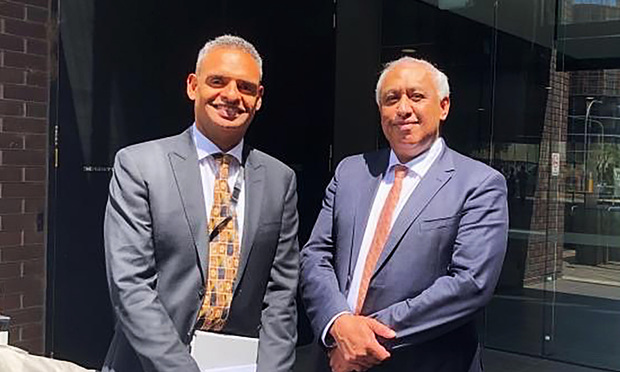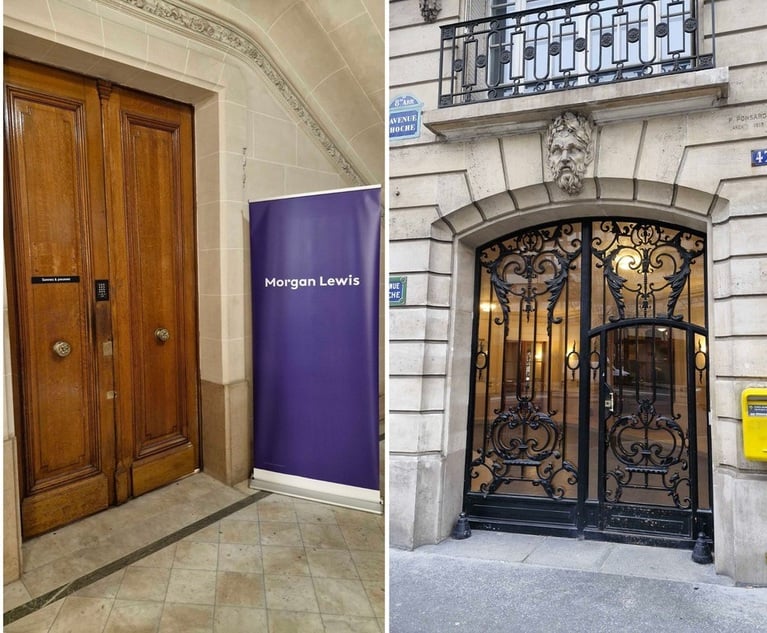Why 2 Australian Indigenous Lawyers Practice Commercial Law
Indigenous lawyers in Australia typically go into practice areas that deal with the issues and problems highlighted by Black Lives Matter and similar protest movements. Bero and Mailman want to broaden their reach as a way to support Aboriginal communities.
July 12, 2020 at 07:00 PM
6 minute read
 Brian Bero (L) and Bevan Mailman (R), of Jaramer Legal, Australia's first national majority Indigenous-owned law firm.
Brian Bero (L) and Bevan Mailman (R), of Jaramer Legal, Australia's first national majority Indigenous-owned law firm.
Human rights and criminal law are often the first choice for Indigenous lawyers working to improve the lot of their people. But Bevan Mailman and Brian Bero have taken a different approach to the advancement of Aboriginal and Torres Strait Islander Australians.
The two principals of Jaramer Legal are commercial lawyers. They aim to lay the economic foundations for change in remote and regional Indigenous communities and to develop Indigenous commercial lawyers.
Jaramer Legal, Australia's first national majority Indigenous-owned law firm, was founded in 2018 as a joint venture between Mailman and Bero and global law firm Norton Rose Fulbright. Norton Rose has a minority interest in the relatively new firm, and provides support in the form of capital, premises and sometimes lawyers on secondment.
"I became a commercial lawyer because I knew that for us as Indigenous people to move forward, we needed to lay our economic platforms and, to lay them, we needed to understand frameworks and the structure of things, such as businesses and trusts," Bero explained.
The firm name, Jaramer, came about because Mailman is from the Bidjara people of Central West Queensland and Beno is from the Meriam people in the Torres Strait Eastern Islands. The two lawyers combined the words to create Jaramer, loosely translating to mean "one mountain."
"We think all communities should come together as one, and the mountain represents a strong base and that base needs to be laid before we go forward," Bero said.
Indigenous Australians sit at or near the bottom of just about every socioeconomic indicator in Australia. Those born between 2010 and 2012 can expect to live about a decade less than the non-Indigenous; about 62% of Indigenous students completed high school in 2014-15, compared with 86% of non-Indigenous Australians; and as of September 2017, Indigenous prisoners represented 27% of the total adult prisoner population while accounting for just 2% of the total Australian adult population.
Mailman and Bero see self-determination and economic empowerment as a path to turning around these numbers.
"There's a need to build generational wealth for communities, especially those that don't have ready access to government services," said Mailman, who is based in Melbourne.
"We're working with those communities to make sure they're self-governing, that they're independent and that they're growing."
Some 70% of Northern Australia is under Native Title ownership, which confers beneficial ownership of land to local Aboriginal and Torres Strait Islanders, including the economic windfall from activities such as mining, grazing, tourism and fishing.
The foundational case for native title rights was Mabo v. Queensland (1992), when Torres Straits Islander land rights campaigner Eddie Mabo challenged and overturned the doctrine of terra nullius, which effectively held that when the English colonized Australia in 1788 the land was uninhabited.
It was through this case that Bero got his first exposure to the law, as a 6-year-old attending a community school founded by Mabo. He watched the land rights activist pursue his campaign and start the court case.
"Because I was so young, I didn't understand that you needed lawyers to fight such things through legal processes. I just thought, 'well, why don't we do it?' And then I realized as I got older that we couldn't because we weren't lawyers," said Bero, who is based in Sydney.
After working as a fitter and turner in mining, Bero studied law and worked as an associate to Federal and Supreme Court judges. He then did stints as in-house counsel at Australia's largest telecommunications company, Telstra, and at tech company Oracle and flagship airline Qantas.
Indigenous lawyers typically go into practice areas that deal with the issues and problems highlighted by Black Lives Matter and similar protest movements: criminal law, family law and human rights law. Bero wanted to change this.
"I didn't actually get into the field of commercial corporate law so I could represent indigenous businesses or the indigenous community specifically," he said. "I thought to myself, why couldn't I get a role as a commercial or corporate lawyer and just be like any other non-Indigenous lawyer and be involved in the deals and sit at the negotiating table."
Through most of his career, he's been the only Indigenous lawyer at the table.
Mailman joined Norton Rose as a cadet—the title given to law students in Australia who work part-time at law firms. One of his earlier supervisors was Peter Cash, a commercial dispute resolution partner and the driving force behind Norton Rose's backing of Jaramer Legal.
Bero and Mailman said their previous work and experience with remote communities equip them to act in the long-term interests of the Indigenous communities they represent.
"We bring an intrinsic knowledge of indigenous culture, the networks and an understanding of how communities actually work," Bero said.
The firm also undertakes commercial work for governments, such as helping to develop Indigenous procurement policies. It also undertakes general commercial work, such as for the Australian Taxation Office or the National Broadband Corporation, which will help expose younger lawyers to the broader field of commercial law.
Bero describes the firm as a startup that's been in operation for just over a year, and said he will work toward building the business before he hires the next generation of indigenous lawyers.
But he wants Jaramer Legal to have a strong employment intake of indigenous lawyers.
"We want to introduce those lawyers not only to the commercial field but also to how important that is in relation to supporting Aboriginal communities in moving forward," Mailman said.
NOT FOR REPRINT
© 2025 ALM Global, LLC, All Rights Reserved. Request academic re-use from www.copyright.com. All other uses, submit a request to [email protected]. For more information visit Asset & Logo Licensing.
You Might Like
View All
Deadline Extended for The European Legal Innovation & Technology Awards
1 minute read
Morgan Lewis Says Global Clients Are Noticing ‘Expanded Capacity’ in Paris After Kramer Merger
5 minute read
Debevoise, Norton Rose & Boies Schiller Lead Surge in Mining Disputes With African Governments
5 minute read
Linklaters Continues Renewable Energy Hot Streak With Latest Offshore Wind Farm Project
2 minute readLaw Firms Mentioned
Trending Stories
- 1Robinson & Cole Adds to Immigration Team in Philly
- 2DC Circuit Revives Firefighters' Religious Freedom Litigation in Facial Hair Policy Row
- 3‘High Demand’: Former Trump Admin Lawyers Leverage Connections for Big Law Work, Jobs
- 4Considerations for Establishing or Denying a Texas Partnership to Invest in Real Estate
- 5In-House AI Adoption Stalls Despite Rising Business Pressures
Who Got The Work
J. Brugh Lower of Gibbons has entered an appearance for industrial equipment supplier Devco Corporation in a pending trademark infringement lawsuit. The suit, accusing the defendant of selling knock-off Graco products, was filed Dec. 18 in New Jersey District Court by Rivkin Radler on behalf of Graco Inc. and Graco Minnesota. The case, assigned to U.S. District Judge Zahid N. Quraishi, is 3:24-cv-11294, Graco Inc. et al v. Devco Corporation.
Who Got The Work
Rebecca Maller-Stein and Kent A. Yalowitz of Arnold & Porter Kaye Scholer have entered their appearances for Hanaco Venture Capital and its executives, Lior Prosor and David Frankel, in a pending securities lawsuit. The action, filed on Dec. 24 in New York Southern District Court by Zell, Aron & Co. on behalf of Goldeneye Advisors, accuses the defendants of negligently and fraudulently managing the plaintiff's $1 million investment. The case, assigned to U.S. District Judge Vernon S. Broderick, is 1:24-cv-09918, Goldeneye Advisors, LLC v. Hanaco Venture Capital, Ltd. et al.
Who Got The Work
Attorneys from A&O Shearman has stepped in as defense counsel for Toronto-Dominion Bank and other defendants in a pending securities class action. The suit, filed Dec. 11 in New York Southern District Court by Bleichmar Fonti & Auld, accuses the defendants of concealing the bank's 'pervasive' deficiencies in regards to its compliance with the Bank Secrecy Act and the quality of its anti-money laundering controls. The case, assigned to U.S. District Judge Arun Subramanian, is 1:24-cv-09445, Gonzalez v. The Toronto-Dominion Bank et al.
Who Got The Work
Crown Castle International, a Pennsylvania company providing shared communications infrastructure, has turned to Luke D. Wolf of Gordon Rees Scully Mansukhani to fend off a pending breach-of-contract lawsuit. The court action, filed Nov. 25 in Michigan Eastern District Court by Hooper Hathaway PC on behalf of The Town Residences LLC, accuses Crown Castle of failing to transfer approximately $30,000 in utility payments from T-Mobile in breach of a roof-top lease and assignment agreement. The case, assigned to U.S. District Judge Susan K. Declercq, is 2:24-cv-13131, The Town Residences LLC v. T-Mobile US, Inc. et al.
Who Got The Work
Wilfred P. Coronato and Daniel M. Schwartz of McCarter & English have stepped in as defense counsel to Electrolux Home Products Inc. in a pending product liability lawsuit. The court action, filed Nov. 26 in New York Eastern District Court by Poulos Lopiccolo PC and Nagel Rice LLP on behalf of David Stern, alleges that the defendant's refrigerators’ drawers and shelving repeatedly break and fall apart within months after purchase. The case, assigned to U.S. District Judge Joan M. Azrack, is 2:24-cv-08204, Stern v. Electrolux Home Products, Inc.
Featured Firms
Law Offices of Gary Martin Hays & Associates, P.C.
(470) 294-1674
Law Offices of Mark E. Salomone
(857) 444-6468
Smith & Hassler
(713) 739-1250








